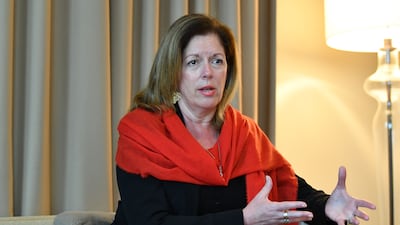UN Special Adviser on Libya Stephanie Williams, who is leaving the position she has held since 2001, has thanked all sides for co-operating with her efforts to put the North African country back on the pathway to elections.
Ms Williams’ main priority was to listen to the millions of Libyans who registered to vote in order to restore the legitimacy of the country's institutions through national elections.
She said she had reached out to the “broadest possible spectrum” of the people involved in Libya’s political, security and social domains to listen and understand their concerns.
She also considered their vision for the future of their country, as well as their ideas and suggestions to help Libya to end the long period of transition that has beset the country since 2011.
Ms Williams explained that she had led the three intra-Libyan tracks laid out by the Berlin Conference and enshrined in the subsequent UN Security Council resolutions.
She expressed appreciation for the commitment of the 5+5 Joint Military Commission to maintain the October 2020 ceasefire agreement and to press ahead with plans to unify the military institutions.
Ms Williams also applauded the lifting of the oil blockade but voiced concern about efforts to politicise the National Oil Corporation, saying that the state energy company and all sovereign institutions should enjoy “complete autonomy and independence from political manoeuvring”.
The country’s revenue must be transparently managed and the recommendations of the UN-arranged audit of the Central Bank of Libya should be fully enforced, including the much-needed unification of the bank, said Ms Williams.
“I thank the [UN] secretary general for entrusting me with the leadership of the United Nations' good offices, and the terrific United Nations' team in Libya for their steadfast support throughout my tenure,” she said.
Ms Williams said she had advocated the inclusion of youths in the political process and called for their voices to be “lifted”.
“I urge Libyan leaders and institutions to commit seriously to protecting women’s participation in public life. There can be no meaningful participation without protection. Violence against women in Libya must stop,” she said.
Ms Williams comes from a background of extensive experience in diplomacy and foreign security policy, both internationally and in the US.
Before being appointed to the Libya position, she had previously served in two other UN positions and had worked on Libyan issues, as part of the US Senior Foreign Service, since 2018.
As well as these roles, Ms Williams has held extensive diplomatic positions throughout the Middle East.
She graduated with honours from the University of Maryland in 1987 with a double degree in economics and government relations. In 1989, she earned a master’s degree in Arab studies from Georgetown University’s Centre for Contemporary Arab Studies.
She is a Distinguished Graduate of the National War College, where she earned a master’s degree in national security studies in 2008. She is fluent in English and Arabic.










